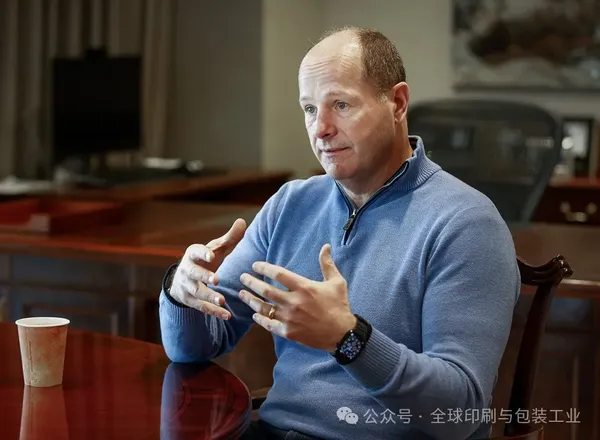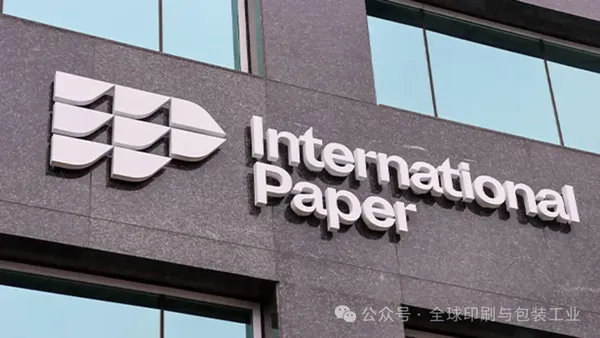Industry peers must see! International Paper's major transformation, Lighthouse Factory + 80/20 Rule!
International Paper is undergoing a period of transformation, with company executives stating during last Tuesday's Investor Day event that their goal is to achieve growth in several business areas by 2027. They detailed the significant changes International Paper has undergone over the past year and in the coming months, including the expansion of International Paper's "80/20 optimization strategy" to Desma, a company recently acquired by International Paper.
International Paper aims to reach sales of $26-28 billion by 2027; the company expects sales of $27 billion in 2025. CEO Andy Seigneur notes another goal is to achieve adjusted EBITDA of $6 billion that year. He believes, although this represents significant growth from the expected adjusted EBITDA of $3.5-4 billion this year, it is entirely achievable.
"We firmly believe that we can change this company," Silverner said. He led the attendees to recall the tremendous changes in the world over the past 25 years, and pointed out, "To be honest, International Paper has not been changing fast enough. The reason I joined International Paper was to drive the transformation—the real purpose."
International Paper expects annual capital expenditures to reach $1.9 billion by 2027. The majority of this funding will be used to strengthen its box plant network, including the recently announced greenfield box plant in Waterloo, Iowa, which is expected to begin operations next year.
During the Investor Day event, much of the content revolved around the strategic adjustments implemented by Silverneil after he joined the company in May of last year, which took place in a certain month last year. He previously described the "80/20 approach" as a strategy to align resources to drive outcomes, grounded in the Pareto Principle—the idea that 80% of results often stem from 20% of the causes. "For us, the '80/20' approach helps clarify what matters most, where the value lies, and how to relentlessly pursue that value to create a competitive advantage."
Another important segment of this event focused on the integration progress of DS Smith, headquartered in London. International Paper (based in Memphis, Tennessee) completed the acquisition of the company this January. Company executives confirmed that DS Smith will initiate its own "80/20 Plan" based on International Paper’s successful experience to date.
Silvernell explained that the merger of the two companies is essentially International Paper acquiring Dismat's business in North America, while Dismat is acquiring International Paper's business in Europe. Silvernell stated that as the integration progresses, "we will place a strong emphasis on various geographic regions." Considering the opportunities brought by the "80/20" strategy and other initiatives, International Paper has raised its synergy forecast with Dismat from the previous $514 million to between $600 million and $700 million.
Optimization in North America centered on "The Lighthouse"
Company executives pointed out that as part of International Paper's restructuring plan, their "lighthouse" pilot projects, centered around regional hubs, have been successful in streamlining the operational network and improving efficiency. However, this process has not been smooth. The optimization measures under the "80/20" strategy have led International Paper to close plants and reduce staff over the past year, with layoffs exceeding 1,500 since the fall. Last month, International Paper announced the closure of several plants, including the Red River Boxboard Mill in Louisiana. Executives stated that tougher decisions will be made in the future. "We will make difficult choices in resource allocation to ensure our employees are positioned for favorable development," Silvernell said, "This will enable us to achieve growth."
The majority of the business scope reconfigurations in the North American region have been focused on International Paper's network of box plants. Silvernell explains that part of International Paper’s network in the U.S. suffers from excess capacity, while other parts are capacity-constrained, hence the need for coordination. These adjustments include "reinvesting in our existing footprint to give it the appropriate capability but also aligning with our actual needs," he said.
Focusing on customer needs is also a fundamental theme of this investor day event. This is closely related to resource allocation. "We are discussing the packaging business, not just the linerboard business and converting business," said Tom Hamik, Executive Vice President and President of North American Packaging Solutions. The "lighthouse" factories include two types: super factories and hybrid factories. The former mainly produces standardized products for long-term customers, while the latter focuses on short-term and more complex product production. The initial two pilot "lighthouse" factories were launched in the metropolitan areas of Atlanta and Chicago.
Creating "lighthouse" factories often requires closing facilities in certain areas to reduce costs while investing in nearby facilities. For example, when International Paper invested in a "lighthouse" factory in the Atlanta area, it closed a facility in Cleveland, Tennessee. "In the Atlanta and Chicago pilot areas, our preliminary assessment of the 'lighthouse' factories shows that we have reduced fixed costs by $20 million and increased productivity by 20%," said Tom Hamrick. Since these early pilots, the "lighthouse" factory model has been expanded to an additional 24 factories. International Paper plans to extend this model to over 60 factories by the end of this year.
Desma adopts the 80/20 strategy.
Not long after the acquisition is completed, it is clear that DS Smith will keep the name of its wholly-owned subsidiary and will not be replaced by International Paper. In February, International Paper announced that CFO Tim Nichols would take on the newly created position of executive vice president and president of DS Smith, effective April 1.
Tim Nichols provided a detailed overview of the operational status of DS Smith post-acquisition, particularly the implementation of the "80/20" strategy in the company's Europe, Middle East, and Africa (EMEA) division. Company executives explained that due to the relatively weaker European market compared to North America, DS Smith's progress has been slower than anticipated. "We are in a period of market weakness, but we will recover. Although the integration of DS Smith into International Paper is still in its early stages, we have made a good start," he added.
Tim Nichols said that implementing the "80/20" strategy in Europe, focusing on matching the right customers with the right asset base, is one of the opportunities to accelerate growth potential. "The good news is that we have well-maintained assets," Tim Nichols noted, as DESMAR has invested heavily in its corrugated board plants and paper mills. "There have also been some recent investments that will help us quickly get started on how to deploy the '80/20' strategy in the indirect sector."
Developing "super factories" in Europe will involve investments in new facilities as well as expanding the capacity of existing ones. Tim Nichols emphasized focusing on meeting customer demand, stating, "We aim to invest in products we can sell rather than just selling what we produce." Next month, International Paper will gather over 100 Desma business leaders to receive training on deploying the "80/20" strategy in their respective regions. Desma employees who have already undergone some related training have "wholeheartedly embraced this strategy," he said. This service will first be launched in major European markets such as the UK and will expand to other regions over the next few months.
Silvernel said that completing the restructuring in North America and successfully implementing the strategy in Europe would require overcoming many challenges. But he said that everything was proceeding smoothly and would eventually build a world-class, highly profitable international paper company. "We are not naive to think that the problems we are solving are easy. But this team has committed to making the transformation," Silvernel said in his final comments, "You have to take control of your own destiny."
【Copyright and Disclaimer】The above information is collected and organized by PlastMatch. The copyright belongs to the original author. This article is reprinted for the purpose of providing more information, and it does not imply that PlastMatch endorses the views expressed in the article or guarantees its accuracy. If there are any errors in the source attribution or if your legitimate rights have been infringed, please contact us, and we will promptly correct or remove the content. If other media, websites, or individuals use the aforementioned content, they must clearly indicate the original source and origin of the work and assume legal responsibility on their own.
Most Popular
-

List Released! Mexico Announces 50% Tariff On 1,371 China Product Categories
-

Dow, Wanhua, Huntsman Intensively Raise Prices! Who Controls the Global MDI Prices?
-

Clariant Unveils Cost-Cutting Plan Details, Plans to Shut Down Multiple Plants
-

New Breakthrough in Domestic Adiponitrile! Observing the Rise of China's Nylon Industry Chain from Tianchen Qixiang's Production
-

Nissan Cuts Production of New Leaf EV in Half Due to Battery Shortage








